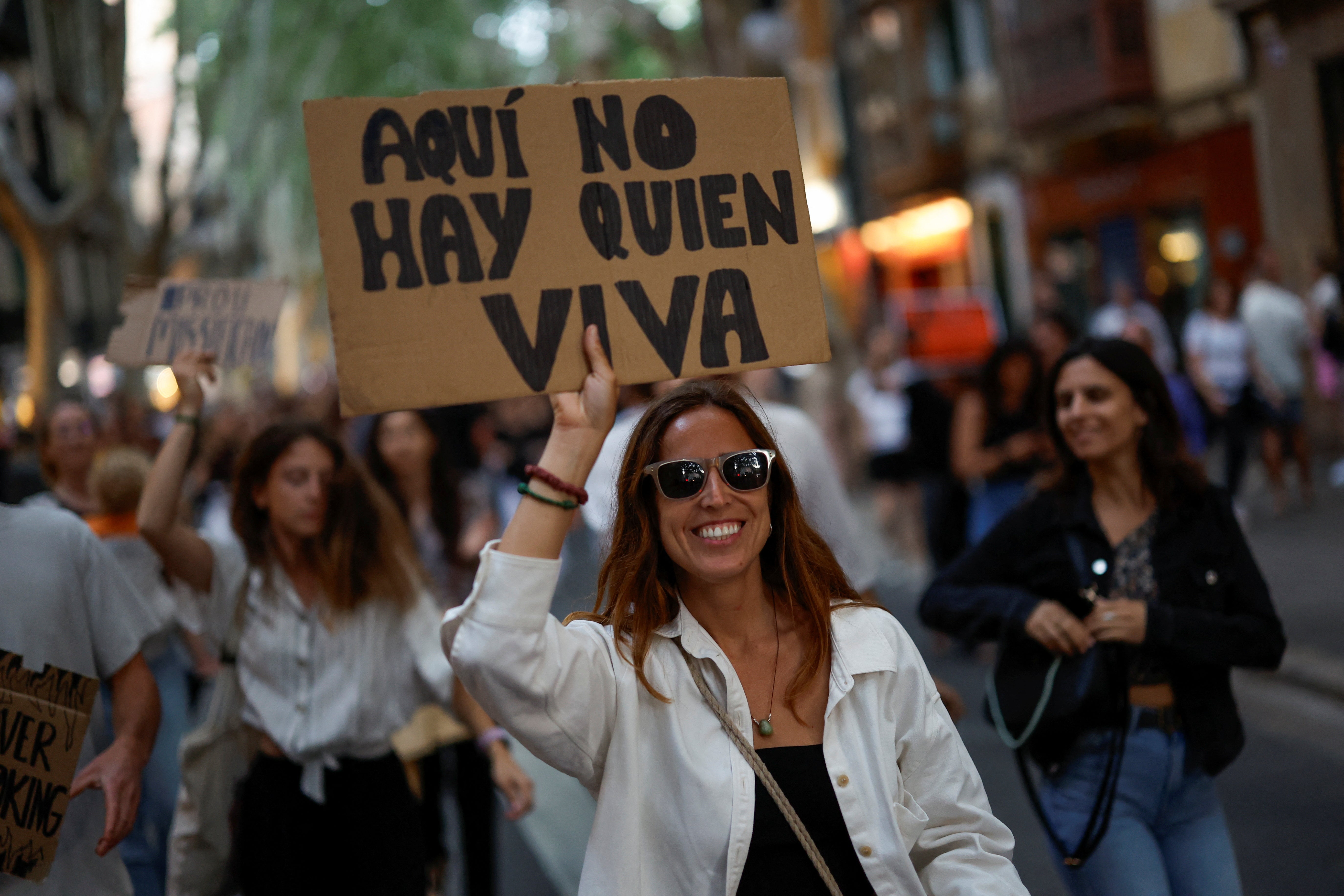Mallorca is going all out to repel tourists – but I won’t stop holidaying there
Residents on the Mediterranean island have tried noisy street protests and turfing visitors off their favourite beach – now, one Mallorcan town has announced it is turning off its taps. Richard Chapman, who has a second home there, won’t be discouraged


Like the holidaymaker laying down his beach towel at the crack of dawn, protests against overtourism in Mallorca have started even before the summer season has got going.
Banyalbufar, an unspoilt village nestled in a picturesque bay that has panoramic views across the Mediterranean and is popular with Richard Branson (he owns Son Bunyola, the “secluded luxury” spa resort), has this week announced an extraordinary water ban.
From next week, the region’s taps will be turned off between 11pm and 4pm the next day, in a bid to mitigate the impact from the tourists who, no pun intended, will soon be flooding onto the island. One assumes that it will send a crystal-clear message to those thinking of visiting this summer: sorry, you’re not welcome.
For decades, Mallorca has been synonymous with brilliant white-sand beaches and occasionally raucous nightlife, and residents have had enough. They want their island back – and will occupy their beaches if they must.
More than 10 million visitors a year have brought gridlock to the roads, eaten into precious resources (as well as the struggle to supply the island with drinking water, it is almost entirely dependent on the import of food), and prevented the economy from diversifying away from mass tourism.
The notorious party resorts of Magaluf and S’Arenal are accustomed to the occasional protest, but the anti-tourist feeling is now growing at such a pace that there’s a question mark over the future of tourism on the holiday island. This, despite tourism accounting for almost half of the Balearic Islands’ gross domestic product.
In March, more than 10,000 people marched through Palma, chanting, “Let’s save Mallorca”. Now, things are really getting out of hand.
Last month, hundreds of activists, some in T-shirts saying “ATAB – All Tourists Are B*****ds”, descended on Calo des Moro – a once-lovely, secluded cove on Mallorca’s southern shoreline that has become an Instagram honeypot – to jeer the sunbathers and demand they leave the beach because “for one day, we’re going to enjoy it”. One placard read, “Beware of locals – we are angry”, while a giant banner unfurled along the shoreline declared, “Ocupem les nostres platges” – “We will occupy our beaches”.
It’s a far cry from when the Spanish government warmly welcomed tourists to Mallorca. The Balearics embraced mass tourism in the late 1960s – and soon after, in the early 1970s, my grandmother bought a house inland, away from the busy southwest coastline. She used to winter on the island to escape chilly Britain. All year round, for more than half a century, we’ve been coming to the island as a family.
The difference between us and a tourist who comes for a fortnight is that we’ve essentially been living here part-time for generations. When we go down to the village, to the restaurant or the cafe, we see the restaurant owner, the bank manager, or the daughter of the lady who used to look after our house during the winter. We see her grandchildren, we see her great-grandchildren, and they all nod and wave at us. We feel part of the community.
So where do the members of the overtourism movement draw the line? Are some tourists more welcome than others? Would they say no pasaran to someone with a wheelie suitcase visiting for a fortnight? Someone with an Airbnb booking?
Almost half of Spaniards now believe Madrid should limit the number of tourists to the island – but I say it’s difficult to decide what a good or bad tourist looks like.
There’s no way my family and I will stop coming here. For much of the year, it’s our home. Not coming would be unimaginable.
Since the 1960s, Mallorcans have built thousands of houses and apartments with the sole aim of getting international investors to buy here. Where we live, everyone is from all over the place – from Germany, Denmark, Holland, and, of course, the UK. I don’t think it would make the slightest bit of difference if protesters said we were the wrong kind of tourist.
Do they want less money to come to the island, less investment, less shopping? Less footfall? It’s hard to know what those protesting about overtourism hope to achieve.
Certainly, the island has a huge problem with cars. Everywhere you go, rental vehicles are clogging up villages. If you want to drive somewhere, it can be increasingly tricky to park. It makes it difficult to enjoy the more secluded, out-of-the-way places you might otherwise visit – but it also makes life harder for locals.
Popping to the local village for breakfast or a cup of coffee becomes a nightmare if there’s nowhere to stop. To combat the traffic, the government has increased the number of taxi licences, but this has yet to make a dent in the problem.
And are the protests against mass tourism having the opposite effect? According to the latest TravelgateX data, rather than putting Brits off the Balearics, tourist bookings are almost a quarter higher than two years ago.
It remains to be seen whether the anti-tourism protests will have any positive effect on island life this summer – or whether, as the saying goes, there’s no such thing as bad publicity.






Join our commenting forum
Join thought-provoking conversations, follow other Independent readers and see their replies
0Comments